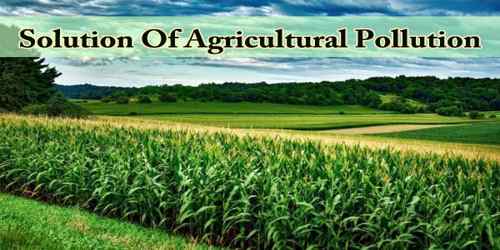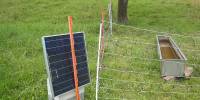Agricultural pollution may come from a variety of sources, ranging from point source water pollution (from a single discharge point) to more diffuse, landscape-level causes, also known as non-point source pollution. Management practices play a crucial role in the amount and impact of these pollutants. Management techniques range from animal management and housing to the spread of pesticides and fertilizers in global agricultural practices.
For many years, our ancestors did farming in a sustainable way, thus there were almost no problems with agricultural pollution.
However, due to the optimization of yields over time through the excessive use of fertilizers and pesticides, agricultural pollution became a significant problem to the environment.
Farming operations can contribute to nutrient pollution when not properly managed. Fertilizers and animal manure, which are both rich in nitrogen and phosphorus, are the primary sources of nutrient pollution from agricultural sources. Excess nutrients can impact water quality when it rains or when water and soil containing nitrogen and phosphorus wash into nearby waters or leach into groundwaters.
Fertilized soils and livestock can be significant sources of gaseous, nitrogen-based compounds like ammonia and nitrogen oxides. Ammonia can be harmful to aquatic life if large amounts are deposited to surface waters. Nitrous oxide is a potent greenhouse gas.
Solutions to the Agricultural Pollution Problem –
Reduce the use of fertilizer and pesticides: Farmers should try to improve nutrition management so that fertilizer and pesticides are not used in excessive amounts in order to mitigate the agricultural pollution problem. This means to determine in a scientific way how much pesticides and fertilizer are necessary to get a reasonable crop yield. Many farmers could reduce the use of fertilizers and pesticides significantly and still get decent crop harvests.
Avoid soil erosion by planting all over the year: Cover crops can be used when the actual harvest is over in order to prevent bare ground which can lead to soil erosion and therefore to a loss of waterways.
Plant trees or grasses along the edges of fields: Planting grasses and trees along the edges of a field is important when the field lies on the borders of water bodies. Through this planted buffers, nutrient losses can be avoided by filtering out nutrients before reaching the groundwater.
Adjust the intensity of the tillage of a field: Farmers should consider the reduction in the tillage of their fields in order to reduce runoffs, soil compaction, and erosion. Thus, a more sustainable path towards farming and a reduction in agricultural pollution could be accomplished.
Improve manure management: Animal waste is a big cause of agricultural pollution. Thus, it is crucial to set up and improve processes concerning the management of these pollutants. There are several manure treatment processes which aim to reduce the adverse impact of manure on the environmental system. These processes have to be developed further in order to improve the situation.
Change our consumption behavior: Part of this problem lies in the fact that most of us consume an excessive amount of meat. In order to meet this demand, farmers have to use large amounts of fertilizer to grow enough animal feed to be able to meet the meat demand. Changing our consumption behavior to less meat consumption can mitigate the problem of agricultural pollution to a certain degree.
Prevent excess nutrients from reaching the water: Farmers can build fences along with water bodies in order to prevent access for animals and thus excessive amounts of nutrients enter the water. Although this is just a small measure in order to reduce agricultural pollution, it still is a small step in order to reach our goal of less pollution.
Raise the awareness of farmers on the topic of agricultural pollution: Farmers have to be convinced and educated of the negative effects they may (often unknowingly) cause to the environmental system. They should be taught that the excessive use of fertilizer and pesticides has a huge adverse impact on the whole ecosystem. Thus, by increasing the farmers’ knowledge, agricultural pollution can be mitigated to a certain degree.
Education: Education is key in order to solve any kind of problem. We have to make people aware of the adverse consequences regarding agricultural pollution. This education has to start at a young age.
By educating children about agricultural pollution and its negative consequences for the environment, we can make a huge impact on a behavioral change in our environment. These children will be likely to convince their parents regarding the negative impacts they make in their daily life. Parents may also change their consumption behavior due to their children’s’ opinions.
Moreover, in later years when educated children have grown up, they may also have a positive impact since they may avoid consumption behavior that supports agricultural pollution. Thus, education is quite important to motivate people to change their behavior and therefore to fight the issue of agricultural pollution.
Convince others: Our contribution is an important part to solve the problem of agricultural pollution. However, our daily actions are not enough to make a big impact. We also have to convince our family and friends about the negative effects of their consumption behavior on our environment. We have to show them how they indirectly contribute to agricultural pollution on a daily basis. By doing so, people are likely to change their behavior. To make this process even more effective, we not only have to show people how they adversely impact the environment with their actions, we also have to show them alternatives.
Complaining is not enough, we also have to point out practical solutions which can be implemented in our daily life. For instance, this could mean reducing meat consumption from a daily basis to a few times a week.
Agricultural pollution can be seen as a serious problem to the environmental system. It affects humans, animals, plants, and also our water cycle in an adverse way. There are many factors that cause agricultural pollution. The main factor that contributes heavily to agricultural pollution is the excessive industrial use of fertilizer and pesticides.
But also, our consumption behavior contributes to agricultural pollution. Thus, these pollution sources can be mitigated in an effective way if the awareness on this topic is increased in our society. If we all stick together, we can help to reduce agricultural pollution even through our consumption behavior in our daily life.
Information Sources:
















